Oklahoma City has introduced a new initiative called Mobile Integrated Healthcare (MIH) to manage mental health-related 911 calls more effectively. This program aims to reroute mental health emergencies from police to trained behavioral health professionals, ensuring that individuals in crisis receive the appropriate support.
The MIH program began operations in late 2024 with a dedicated team of 27 members, including clinicians, paramedics, and peer recovery specialists. These teams respond specifically to mental health emergencies, allowing police resources to be allocated to other urgent situations. Assistant City Manager Jason Ferbrache emphasized the need for a response that doesn’t always involve law enforcement, stating that many calls require specialized mental health expertise.
This initiative follows 39 recommendations made to the city in 2022, which focused on improving responses to mental health issues and enhancing community safety. The recommendations stemmed from the efforts of the mayor’s Law Enforcement Policy Task Force and were influenced by calls for police reform after the murder of George Floyd in 2020. Community stakeholders and city officials collaborated to develop solutions that would address behavioral health situations more appropriately.
Mobile Integrated Healthcare builds upon two existing programs within the Oklahoma City Fire Department: the Overdose Response Team launched in 2023 and the Community Advocacy Program initiated in 2019. Andrea Grayson, the Public Safety Partnership’s implementation manager, noted that the MIH program was a natural extension of these efforts, aimed at creating an in-house alternative for mental health crisis response.
The MIH team operates from 7 a.m. to 11 p.m. daily, with plans to expand operating hours in the future. Their work involves four specialized subteams: 1. **Crisis Call Diversion Team**: This team is embedded at the 911 Call Center, providing de-escalation and support to callers in need of mental health services. 2. **Crisis Response Team**: This group responds to immediate mental health emergencies where individuals may pose risks to themselves or others. 3. **Alternative Response Team**: This team handles overdose situations and less severe behavioral health calls. 4. **Community Advocacy Program**: This program connects frequent 911 callers with community resources better suited to meet their needs.
The official launch of MIH took place during a ceremony at the Oklahoma City Fire Department Station No. 1, where Fire Chief Richard Kelley highlighted the program’s focus on mental health and its potential to improve public services. Lori Brown-Loftis, the program manager, expressed her enthusiasm for the initiative, citing its importance in delivering trauma-informed care and helping individuals remain in less restrictive environments.
The program’s development involved the Crisis Intervention Advisory Group, which is made up of mental health experts and community advocates who ensure that best practices are followed. Jessica Hawkins, director of community initiatives at the Healthy Minds Policy Initiative, pointed out that MIH has already made a significant impact by responding to hundreds of calls, freeing law enforcement to focus on public safety tasks that require their expertise.
The MIH initiative not only aims to enhance the quality of mental health crisis responses but also seeks to reduce the burden on police departments. By providing targeted support for mental health crises, the program represents a proactive approach to addressing community needs and fostering safer environments for all residents.



